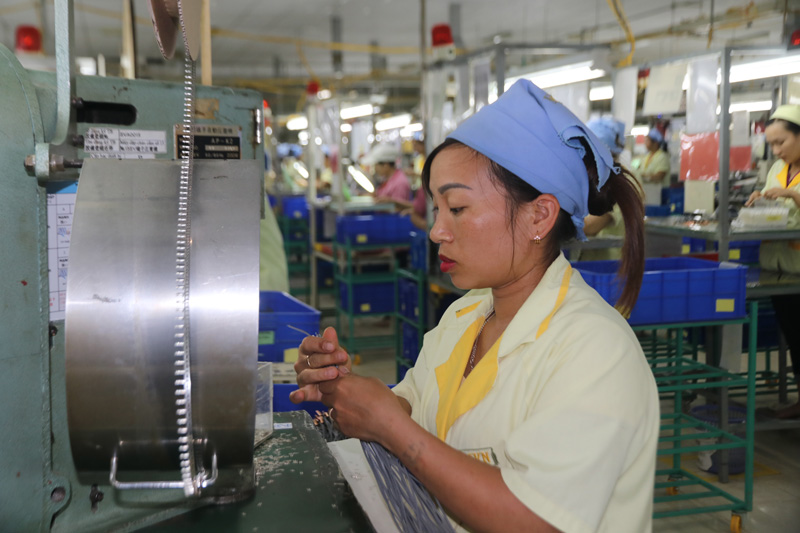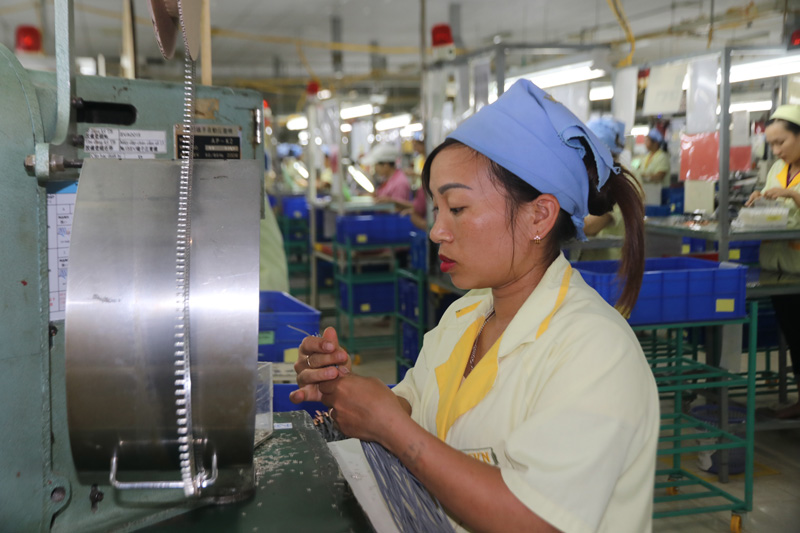
(HBO) – A ceremony for the Dai Nghia multi-sector cooperative to make its first public appearance was held at the cultural house on Re street, An Nghia commune in Lac Son district of the northern mountainous province of Hoa Binh in mid-October.
With a
charter capital worth 850 million VND (36,555 USD), the cooperative has 20
members.

The Lac Son branch of Sankoh Company Limited generates jobs for nearly 1,000 local labourers.
Also in Lac Son district, a plant manufacturing electronic
components in Xuat Hoa commune employs nearly 1,000 workers. Electronic
components of the plant are manufactured and distributed for domestic and
international industry development.
Spanning an area of 2ha, the Lac Son branch of Sankoh Company
Limited became operational in 2013 with an investment worth more than 100
billion VND, attracting more than 300 labourers at the beginning. Now the
company has about 1,000 workers who earn monthly salary ranging between 4-6
million VND.
Head of the production department of Sankoh company-Lac Son branch
Hiroaki Chiba said along with the main factory in Hoa Binh city, the two plants
create about 200 million pieces each year, raking in about 2 million USD.
The company has been awarded the flag honouring leading FDI enterprises
in Hoa Binh province for many years, as well as certificates of merit from
various sectors at central and provincial levels.
Meanwhile, Lac Son district recorded positive progress in nine
months of 2018. The district’s agencies and People’s Committees of the communes
and towns have strived to implement the year’s plan.
As of the third quarter of 2018, total output of food crops has reached
nearly 67,620 tonnes. The district also improved 219.2 ha of mixed garden. Total
retail sale and revenue in consumer service hit 1.05 trillion VND in the
period.
In addition, the production value of industry and craft industry
in nine months stood at 435 billion VND, and State and the locality’s budget
collection were 27.77 billion VND and 680.531 billion VND.
In its strategy on socio-economic development in upcoming years for
fields in industry and small-scale industry, construction and services, Lac Son
district will work to tap its advantages and continue to bolster industry and handicrafts,
creating favourable conditions for the craft industries such as carpentry,
repair work and mechanics, among others.
It will
also work to sustain and develop traditional craft villages, encourage investment
projects in preservation plants and clean technology in agricultural product post-harvest
processin
According to data from the Hoa Binh Provincial Party Committee, the industrial production index for the first six months of 2025 is estimated to have increased by 20% compared to the same period last year. This marks the highest year-on-year growth rate for this period since 2020.
In the first six months of 2025, Hoa Binh province’s export turnover was estimated at 1.145 billion USD, marking an 18.11% increase compared to the same period in 2024. Import turnover was estimated at $ 804 million, a 17.15% increase, which helped the province maintain a positive trade balance.
The lives of the ethnic minority farmers in Tan Lac district have gradually improved thanks to the new directions in agricultural production. This is a testament to the collective strength fostered through the professional associations and groups implemented by various levels of the district’s Farmers’ Union.
With the motto the "product quality comes first,” after nearly one year of establishment and operation, Muong village’s Clean Food Agricultural and Commercial Cooperative, located in Cau Hamlet, Hung Son Commune (Kim Boi district), has launched reputable, high-quality agricultural products to the market that are well-received by consumers. The products such as Muong village’s pork sausage, salt-cured chicken, and salt-cured pork hocks have gradually carved out a place in the market and they are on the path to obtaining the OCOP certification.
In the past, the phrase "bumper harvest, rock-bottom prices" was a familiar refrain for Vietnamese farmers engaged in fragmented, small-scale agriculture. But today, a new spirit is emerging across rural areas of Hoa Binh province - one of collaboration, organisation, and collective economic models that provide a stable foundation for production.
Maintaining growing area codes and packing facility codes in accordance with regulations is a mandatory requirement for agricultural products to be eligible for export. Recently, the Department of Agriculture and Environment of Hoa Binh province has intensified technical supervision of designated farming areas and packing facilities to safeguard the "green passport" that enables its products to access international markets.



